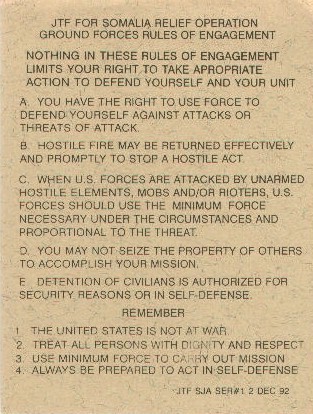Rules of Engagement (ROE)
Introduction: Rules of Engagement – general
Within the wider context of the laws of armed conflict, the political and legal mandate under which forces operate in a given conflict, and military bureaucratic-legal structures of authority and command, rules of engagement are rules for military force specifying the circumstances and manner and limits of the use of force. In the NATO and US military usage, rules of engagement are
“directives issued by competent military authority which specify the circumstances and limitations under which forces will initiate and/or continue combat engagement with other forces encountered.”
With the increased frequency of a variety of forms of state armed conflict other than declared wars, and with the rise of a degree of global public scrutiny of the activities of military forces in armed interventions and peace-keeping operations, specification and scrutiny of whether or not the activities of armed forces conform to both wider structures of law and specific sets of rules of engagement has also increased. Most governments do not disclose the specific and detailed rules of engagement under which particular armed forces are operating on the grounds that opposing forces would then be able to take advantage of self-imposed constraints. Equally rules of engagement in given situations become a matter of controversy in the eyes of both critics of inappropriate use of violence and critics of “insufficiently robust” or restrictive rules of engagement.
Rules of engagement are especially important in the context of peace-keeping operations and humanitarian interventions. In the context of the privatization of security forces in even extreme conflict zones there is substantial concern about the lack of regulation of private security operators.
One other area of great concern have been the rules of engagement applying to interrogation of prisoners by US, Australian and other coalition forces, especially in the context of the refusal by governments of those countries to view prisoners as enemy combatants under the Geneva Conventions. This refusal has been accompanied by US official redefinitions of torture.
- Rules of Engagement – Afghanistan and Iraq
- Rules of engagement – Solomon Islands
- Rules of Engagement – Timor
Government sources
Basic Terminology and Concepts in International Peacekeeping Operations: An Analytical Review, Colonel Andrei Demurenko and Professor Alexander Nikitin, translated by Mr. Robert R. Love, Foreign Military Studies Office, Fort Leavenworth, 1997
“Rules of Engagement. One of the most important principles of international peacekeeping operations is restraint in the use of force (weapons). This principle is usually formulated as follows: weapons may be used only under extreme circumstances, when there is no other way to protect the life and health of service personnel. Much significance is attached to the creation, adoption and observance of the “rules of engagement” (abbreviated “ROE” in English-language sources). These rules strictly govern all instances involving the justifiable use of weapons, as well as the restrictions and rules for their use.
“The key elements covered in the rules of engagement are the following:
- rules for carrying and storing weapons;
- definition of the possibilities and rules for the justifiable use of weapons, including: self-defense of peacekeeping personnel, defense of peacekeeping posts and facilities, support of other peacekeeping subunits, [enforcing] compliance with the conditions of demilitarized and buffer zones, and prevention of violent flare-ups that threaten the life and health of the population.
“The rules of engagement state:
- the requirement for, and rules for, giving clear warning as to the possibility that weapons may be used;
- the requirement that actions be taken to forestall situations which could cause arms to be used;
- the display of decisive intent to use weapons if the actions requiring their use do not cease;
- accountability for an inappropriate use of weapons.”
Analysis
Rules of engagement, Wikipedia
Brief basic introduction

Rules of Engagement for Operation Provide Relief, Somalia, 1992
Source, Wikipedia, courtesy of the 75th Ranger Regiment, U.S. Army.
US Rules of Engagement for Iraq, Wikileaks (Wikileaks release date 4 February 2008)
Twenty-seven page 2005 document headed SECRET//REL TO USA, IRQ, MCFI//20151003. DISPLAY ONLY TO IRQ. ANNEX E (CONSOLIDATED ROE) TO 3-187 FRAGO 02, OPORD 02-005. The most detailed US ROE document dealing with recent operations to be made public. Attached Wikileaks article contains summary, and links to analysis by a number of media analyses.
“This establishes the Rules of Engagement (ROE) for all forces under the control of Multi-National Division — Baghdad. Coalition Forces (CF) may establish more restrictive ROE in accordance with their national caveats. Conflicting ROE will be addressed on a case-by-case basis.”
Cross-border clashes from Iraq O.K., Eric Schmitt And Michael R. Gordon, New York Times, 4 February 2008.
Analysis of one aspect of the 2005 leaked US ROE.
Misfortunes of war : press and public reactions to civilian deaths in wartime, Eric V. Larson, Bogdan Savych, RAND Corporation, 2006.
“Adversaries understand the public’s sensitivities to civilian deaths and have sought to exploit civilian casualty incidents to erode the support of domestic publics; drive wedges in coalitions; and affect campaign strategy, targeting, and rules of engagement. The cases of Iraq (1991) and Kosovo (1999) in particular suggested how adversaries have sought to use human shields, provide press access to sites of alleged civilian deaths, and otherwise trumpet these incidents in the press to affect warfighting strategy, not without some success.”
Off Target: The Conduct of the War and Civilian Casualties in Iraq, Appendix E: Rules of Engagement for U.S. Military Forces in Iraq, Human Rights Watch, 2003.
“Issued by U.S. Central Command Combined Forces Land Component Commander.”
ADF Rules of Engagement
- Rules of Engagement – Afghanistan and Iraq
- Rules of engagement – Solomon Islands
- Rules of Engagement – Timor
21 June 2009

